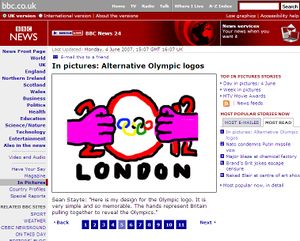UnNews:Aesthetic fears over Olympic logo
5 June 2007
The new logo for the 2012 London Olympic Games is to be removed from the organisers' website after fears it could trigger aesthetic fits.
Prof Graham Hamster, who developed the test used to measure photo-sensitivity levels in TV material, said it should not be broadcast.
Charity Aesthetic Action said it had received calls from people who suffered fits after seeing the animated logo.
Organisers London 2012 said it was looking into it as a matter of urgency.
The jagged emblem, based on a popular political symbol of the 1930s and 1940s, was unveiled on Monday.
Professor Hamster is an expert in clinical neuro-physiology and he designed a test which all moving adverts need to undergo to check they will not trigger a reaction in people with aesthetic discrimination.
He told BBC London 94.9FM: "The logo should not be shown on TV at all at the moment. Or ever. In fact it should be buried under as much concrete as you can find, then wrapped in lead.
"It fails the Hamster FPA machine test which is the machine the television industry uses to test images.
"And so it does not comply with Ofcom guidelines and is in contravention of them."
London 2012 told BBC London: "We are taking it very seriously and are looking into it as a matter of urgency. Just as we have taken seriously all the promises we've made to Londoners. Pass me another hooker, I've had all the coke off this one."
The curator of the Victoria and Albert Museum rang BBC London 94.9FM to say he suffered a seizure while watching the logo on television and his girlfriend also suffered a fit and needed hospital treatment.
"The logo came up on TV and I was thinking about the 2012 Olympics and then I was out," he said.
Aesthetic Action said it had been a hot topic on its website's messageboards.
A spokesman for Tony Blair pledged to work harder to eliminate aesthetic sense in the UK.
Sources[edit | edit source]
- "Aesthetic Action" BBC, June 5, 2007
